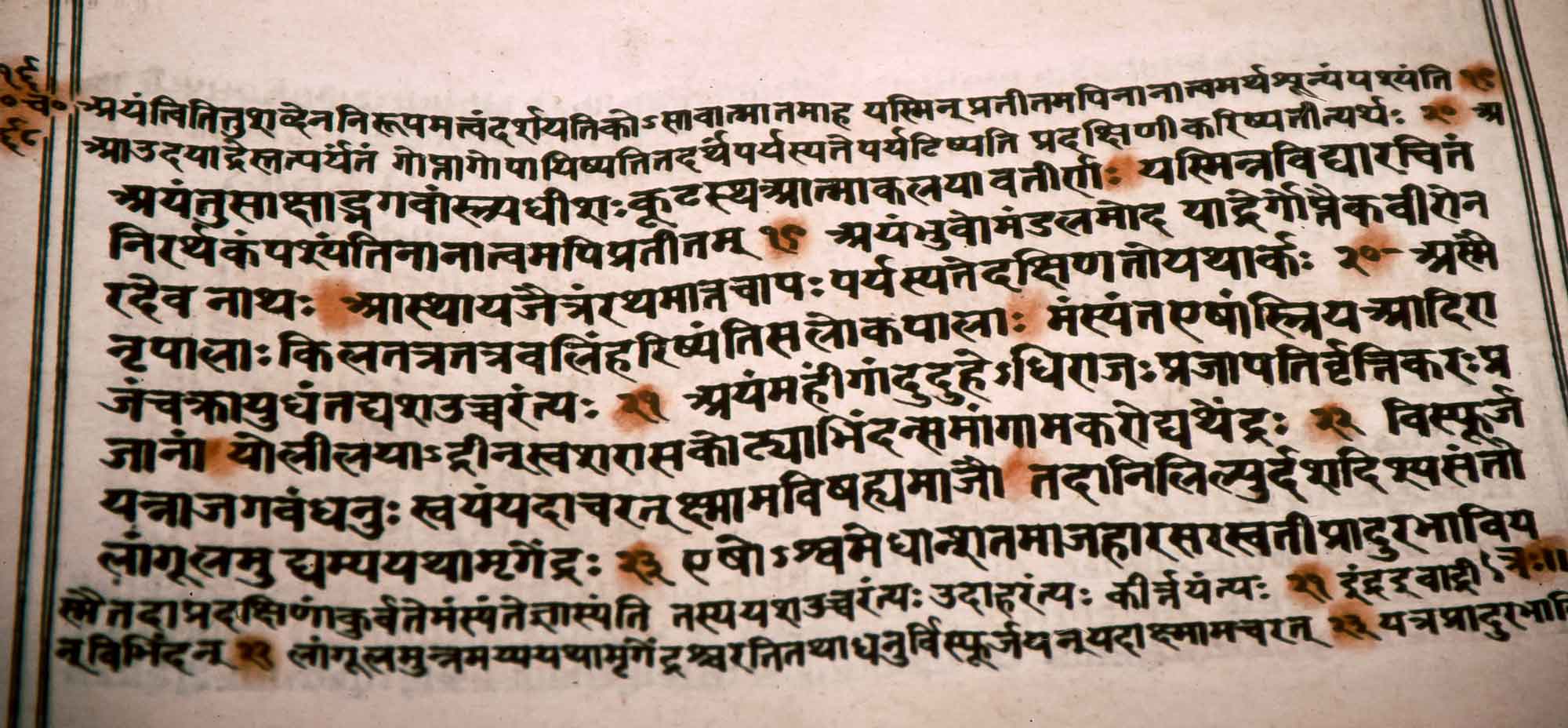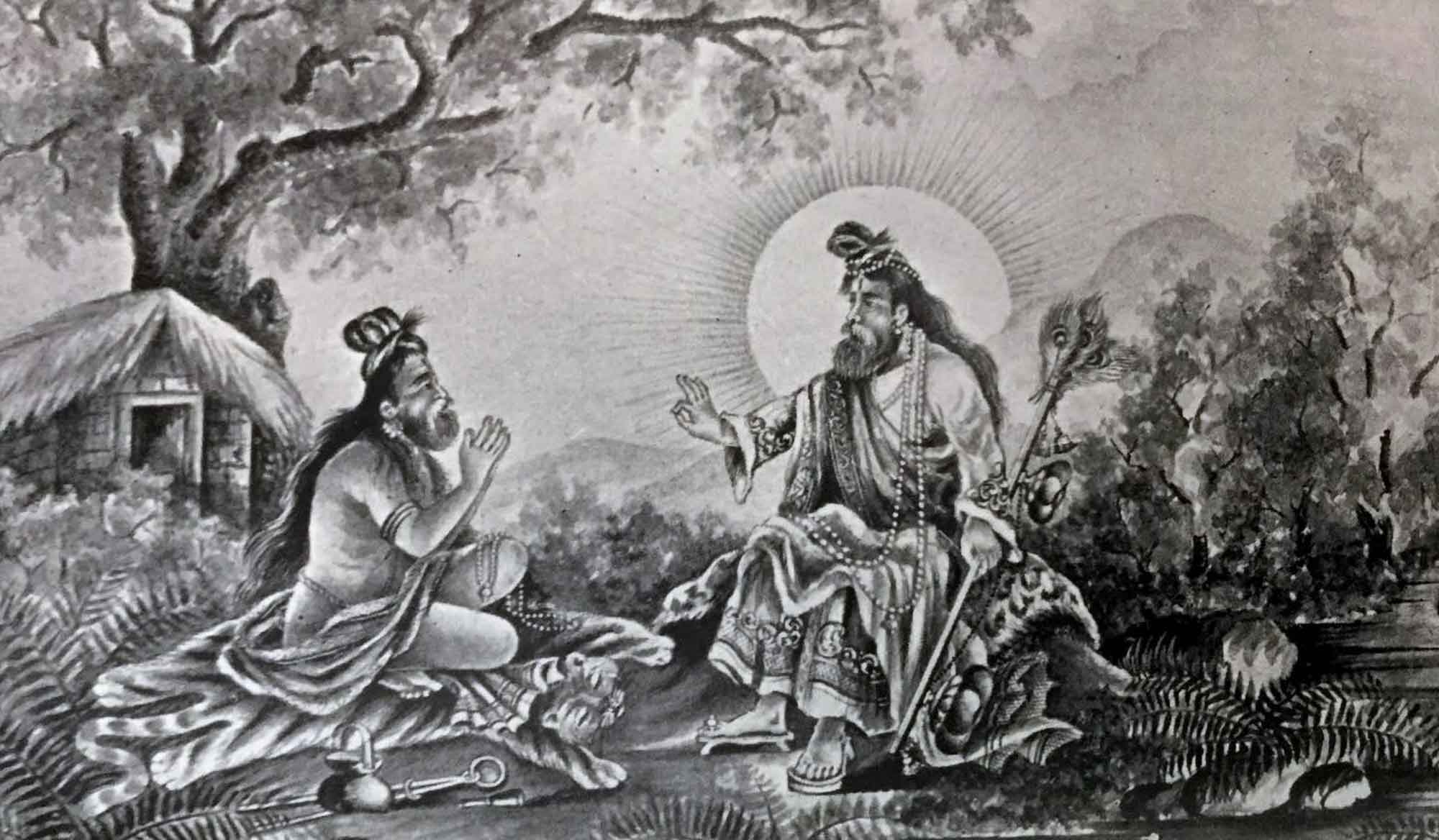Overview
This article "Prayāsa (Over-endeavouring)" is the second of a series of articles published in the 10th Volume of Sajjana Toṣaṇī which deals with the six things that are favourable to bhakti and the six things that are unfavourable according to the second and third verses of Śrīla Rūpa Gosvāmī’s Upadeśāmṛta. This second article deals with Prayāsa – Over-endeavouring and how it can become a serious obstacle to the free flow of bhakti.
(translated by Bhumipati Dasa)
Listen to this article:
If prayāsa is not given up, devotion will never arise. The word prayāsa means endeavour, useless labour. Spiritual life is nothing other than pure devotion unto the Supreme Lord. Devotion cannot be defined by any symptoms other than full surrender and subordination unto the lotus feet of the Supreme Lord. Full surrender and subordination are the natural, eternal constitutional duties of the living entities. Therefore, only devotional service is the natural propensity or inherent occupation. In one’s inherent occupation there is no need of prayāsa; still, in the living entity’s conditioned state there is need for a small amount of prayāsa in order to cultivate devotional service. Except this little prayāsa, all other kinds of prayāsa are unfavourable for devotional service. Prayāsa is of two kinds-jñāna-prayāsa and karma-prayāsa. In jñāna-prayāsa the feeling of oneness, or kevalādvaita, arises. This is also known as sāyujya, merging, or brahma-nirvāṇa, absorption in the Supreme. Jñāna-prayāsa is hostile to spiritual life; this is explained in the Vedic literature, Muṇḍaka Upaniṣad (3.2.3), in the following words:
nāyam ātmā pravacanena labhyo
na medhasā na bahunā śrutena
yam evaiṣa vṛṇute tena labhyas
tasyaiṣa ātmā vivṛṇute tanūṁ svām
“The Supreme Lord is not obtained by expert explanations, by vast intelligence, or even by much hearing. He is obtained only by one whom He Himself chooses. To such a person, He manifests His own form.”
Therefore, devotion is the only way to attain the lotus feet of the Lord. In the Śrīmad-Bhāgavatam (10.14.3) Brahmā says to Lord Kṛṣṇa:
jñāne prayāsam udapāsya namanta eva
jīvanti san-mukharitāṁ bhavadīya-vārtām
sthāne sthitāḥ śruti-gatāṁ tanu-vāṅ-manobhir
ye prāyaśo ‘jita jito ‘py asi tais tri-lokyām
Lord Brahmā said, “O my Lord Kṛṣṇa, a devotee who abandons the path of empiric philosophical speculation aimed at merging in the existence of the Supreme and engages himself in hearing Your glories and activities from a bona fide sādhu, or saint, and who lives an honest life in the occupational engagement of his social life, can conquer Your sympathy and mercy even though You are ajita, or unconquerable.”
In order to further clarify prayāsa, Lord Brahmā says:
śreyaḥ-sṛtiṁ bhaktim udasya te vibho
kliśyanti ye kevala-bodha-labdhaye
teṣām asau kleśala eva śiṣyate
nānyad yathā sthūla-tuṣāvaghātinām
“‘My dear Lord, devotional service unto You is the only auspicious path. If one gives it up simply for speculative knowledge or the understanding that these living beings are spirit souls and the material world is false, he undergoes a great deal of trouble. He only gains troublesome and inauspicious activities. His endeavours are like beating a husk that is already devoid of rice. One’s labour becomes fruitless.”
The philosophy of monism does not originate in the Absolute Truth; it is only a demoniac provision. Glorification of the knowledge of one’s relationship with the Lord is often heard. That knowledge is pure and spontaneous-there is no need of prayāsa. The knowledge given in the Catuḥ-ślokī [the four main Bhāgavatam verses] is acintya–bhedābheda, inconceivably, simultaneously one and different. This knowledge is naturally dormant in the heart of the living entity. The Lord is like a spiritual sun, and the living entities are like molecular particles of the sun’s rays. The living entity cannot remain in his constitutional form without being subordinate to the Lord, therefore servitorship of the Lord is his constitutional duty. Cultivation of this constitutional duty is the nature of the living entity. This is the spontaneous-devoid of prayāsa-dharma, or duty, of the living entity. Although in the conditioned state this dharma is almost dormant and is awakened by sādhana, or spiritual practice, still the prayāsa found in devotional practices is not like that found in the paths of karma and jñāna. If one takes shelter of the holy name with some respect, then within a short time the obstacles due to ignorance are removed and one’s constitutional happiness is reawakened. But if one gives a place to jñāna-prayāsa, then he has to suffer more. And if jñāna-prayāsa is renounced in the association of devotees, then that is a devotional endeavor. The Lord says in the Bhagavad-gītā (12.2-5):
śrī-bhagavān uvāca
mayy āveśya mano ye māṁ
nitya-yuktā upāsate
śraddhayā parayopetās
te
me yuktatamā matāḥ
ye tv akṣaram anirdeśyam
avyaktaṁ paryupāsate
sarvatra-gam acintyaṁ ca
kūṭa-stham acalaṁ dhruvam
sanniyamyendriya-grāmaṁ
sarvatra sama-buddhayaḥ
te prāpnuvanti mām eva
sarva-bhūta-hite ratāḥ
kleśo ‘dhikataras teṣām
avyaktāsakta-cetasām
avyaktā hi gatir duḥkhaṁ
dehavadbhir avāpyate
The Supreme Personality of Godhead said, “Those who fix their minds on My personal form and are always engaged in worshiping Me with great and transcendental faith are considered by Me to be most perfect. But those who fully worship the unmanifested, that which lies beyond the perception of the senses, the all-pervading, inconceivable, unchanging, fixed, and immovable-the impersonal conception of the Absolute Truth-by controlling the various senses and being equally disposed to everyone, such persons, engaged in the welfare of all, at last achieve Me. For those whose minds are attached to the unmanifested, impersonal feature of the Supreme, advancement is very troublesome. To make progress in that discipline is always difficult for those who are embodied.”
In karma-prayāsa there is also no benefit. In the First Canto of the Śrīmad-Bhāgavatam (1.2.8) it is said:
dharmaḥ svanuṣṭhitaḥ puṁsāṁ
viṣvaksena-kathāsu yaḥ
notpādayed yadi ratiṁ
śrama eva hi kevalam
“The occupational activities a man performs according to his own position are only so much useless labour if they do not provoke attraction for the message of the Personality of Godhead.”
Therefore, karma-prayāsa is contrary to devotional principles in the same way as jñāna-prayāsa. The conclusion is that karma-prayāsa and jñāna-prayāsa are very detrimental. But a devotee who desires to properly pass his life still accepts his duties according to varṇāśrama, as those duties are favorable to devotional service and counted as part of devotional service. All these activities are no longer called karma. In these activities, the svaniṣṭha devotees, or devotees addicted to their own line of devotion, bring karma and its results within the realm of devotional service. The pariniṣṭhita devotees, or devotees fully addicted to devotional service, perform pious activities that are not contrary to devotional principles only to attract people. The devotees who are nirapekṣa, or neutral, accept activities favourable for devotional service without caring for popular approval.
Jñāna-prayāsa and its resultant prayāsa for the liberation of merging with the Lord are extremely contrary to devotional principles. If aṣṭāṅga-yoga-prayāsa aims at mystic powers and liberation, then it is also extremely contrary to devotional principles. The rules for devotional practice and the knowledge of the living entities’ relationship of simultaneous oneness and difference are most natural and therefore devoid of prayāsa. This type of activity and knowledge is only accepted as a means. If they are accepted as the goal, then they become the source of fault. I will explain this further under niyamāgraha. The hard labour for activities like visiting holy places is prayāsa that is unfavourable for devotional service. If, however, one goes to the places of Kṛṣṇa’s pastimes with a greedy desire to awaken his ecstatic love for Kṛṣṇa and to associate with the devotees, then this is certainly devotional service-not useless prayāsa. Following the vows of devotional service is not useless prayāsa, they are all accepted as part of the process of devotional service. The prayāsa for serving the Vaiṣṇavas is not prayāsa; for greed to associate with one’s own peers destroys faults in the form of desires to associate with worldly-minded people. The prayāsa for temple worship is a spontaneous manifestation of the heart’s emotions. The prayāsa for activities like saṅkīrtana is only meant to open one’s heart to chanting the Lord’s holy names; it is therefore extremely natural.
There is no need for prayāsa in renunciation; because when devotion to Kṛṣṇa arises in the heart, the living entity easily becomes disinterested in everything other than Kṛṣṇa. The Śrīmad-Bhāgavatam (1.2.7) says:
vāsudeve bhagavati
bhakti-yogaḥ prayojitaḥ
janayaty āśu vairāgyaṁ
jñānaṁ ca yad ahaitukam
“By rendering devotional service unto the Personality of Godhead, Śrī Kṛṣṇa, one immediately acquires causeless knowledge and detachment from the world.”
So when one gives up jñāna, karma, and vairāgya prayāsa and engages in devotional practices, then the obstacles of jñāna, karma, yoga, and vairāgya cannot pull one down. Therefore it is established in the Śrīmad-Bhāgavatam (11.2.42):
bhaktiḥ pareśānubhavo viraktir anyatra caiṣa trika eka-kāla
“Devotion, direct experience of the Supreme Lord, and detachment from other things-these three occur simultaneously for one who has taken shelter of the Supreme Personality of Godhead,”
When a devotee humbly and without duplicity chants and remembers the holy names of Kṛṣṇa, then real intelligence easily awakens in this way: “I am spiritual particle, servant of Kṛṣṇa; Kṛṣṇa is my eternal Lord; surrender to Kṛṣṇa’s lotus feet is my eternal nature; this world is like a traveler’s rest-house; and to be attached to anything of this world will not give me eternal happiness.” Like this, a practitioner soon attains all perfection. Jñāna-prayāsa, karma-prayāsa, yoga-prayāsa, mukti-prayāsa, as well as overendeavoring for material enjoyment, worldly achievements, and association with materialistic people are all hostile principles for one who has taken shelter of the holy name. By these different forms of prayāsa, one’s devotional service is ruined. The prayāsa for attaining pratiṣṭhā, or fame, is the lowest of all kinds of prayāsa. Although it is the lowest, it is unavoidable for many. And that also should be given up by the simple process of devotional service. Therefore, Sanātana Gosvāmī has stated in the Hari-bhakti-vilāsa, the concluding verse:
sarva tyāge ‘py aheyāyāḥ
sarvānartha bhuvaś ca te
kuryuḥ pratiṣṭhāviṣṭhāyā
yatnam asparśane varam
“Even if one can give up all material desires, the desire for fame is very difficult to give up. This desire for fame, which is compared to stool, is the root cause of all anarthas. Therefore, one should carefully avoid touching this stool-like desire for fame.”
This instruction is extremely serious. The devotee should follow this exclusive duty with special care.
A practicing devotee should pass his life in a natural occupation that is favorable to devotional service, and he should chant and remember the holy names with knowledge of his relationship with the Lord. This process of worship without prayāsa again has two different kinds of applications-for householders and for renunciates. Making varṇāśrama favourable to devotional service, the householder should pass his life engaged in devotional service free from prayāsa. They should earn and save only to easily maintain the family members. If they always remember that worshiping Hari is the only purpose of life, then they will never fall into illusion. In happiness and distress, in good fortune and bad, in waking and sleep-in every condition-worshiping Hari will quickly be perfected. And the renunciate should not save at all. He should maintain his body by daily begging alms and thus engage in devotional service. They should not stay in any enterprise. By entering into enterprise, he is at fault. The more he worships the Lord with humility and simplicity, the more he will understand Kṛṣṇa, by His mercy. As stated by Lord Brahmā in the Śrīmad-Bhāgavatam (10.14.8):
tat te ‘nukampāṁ susamīkṣamāṇo
bhuñjāna evātma-kṛtaṁ vipākam
hṛd-vāg-vapurbhir vidadhan namas te
jīveta yo mukti-pade sa dāya-bhāk
“My dear Lord, one who earnestly waits for You to bestow Your causeless mercy upon him, all the while patiently suffering the reactions of his past misdeeds and offering You respectful obeisances with his heart, words and body, is surely eligible for liberation, for it has become his rightful claim.”
Nothing is achieved by jñāna-prayāsa, but one can know Kṛṣṇa only by His mercy. Therefore Śrīmad-Bhāgavatam (10.14.29) says:
athāpi te deva padāmbuja-dvaya-
prasāda-leśānugṛhīta eva hi
jānāti tattvaṁ bhagavan-mahimno
na cānya eko ‘pi ciraṁ vicinvan
“My Lord, if one is favoured by even a slight trace of the mercy of Your lotus feet, he can understand the greatness of Your personality. But those who speculate to understand the Supreme Personality of Godhead are unable to know You, even though they continue to study the Vedas for many years.”
If one takes shelter of the holy names with humility, then by the mercy of the Lord – without prayāsa – all knowledge of the Absolute Truth that should be known awakens within the heart of the simple devotee. This knowledge is never attained by independent prayāsa.
(Prayāsa (Over endeavouring) is the second in a series of articles published in the 10th Volume of Sajjana Toṣaṇī by Bhaktivinoda Ṭhākura. This article was translated by Bhumipati Dasa)
Related Articles and Books:
Further Reading:
- Upadeśāmṛta (The Nectar of Instruction) with the illuminations of Śrīla Śrīdhara Deva Gosvāmī’ (Book)
- Upadeśāmṛta Audiobook
- Dāsa Gosvāmī and the Unique Position of Govardhana by Śrīla Bhakti Gaurava Narasiṅgha Mahārāja
- Śrīla Śrīdhara Mahārāja and the Gem of All Conceptions by Śrīla Bhakti Gaurava Narasiṅgha Mahārāja
- The Appearance of Rādhā-kuṇḍa by Śrīla Bhakti Gaurava Narasiṅgha Mahārāja
- The Greatest Negative by Śrīla Bhakti Gaurava Narasiṅgha Mahārāja
- Preface to the Upadeśāmṛta by Śrīla Bhakti Kiśora Āraṇya Mahārāja













